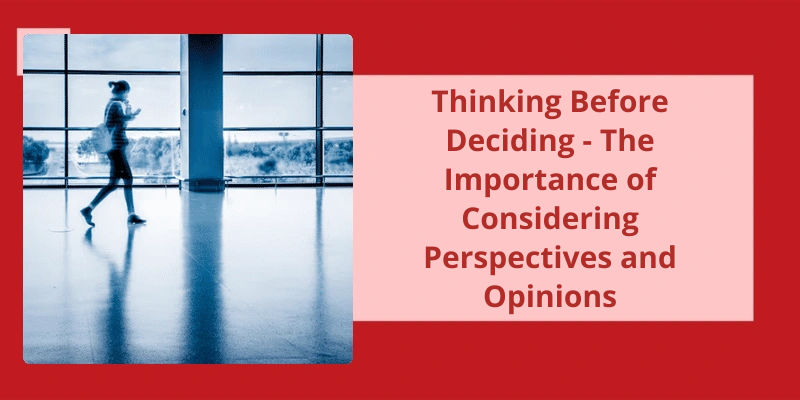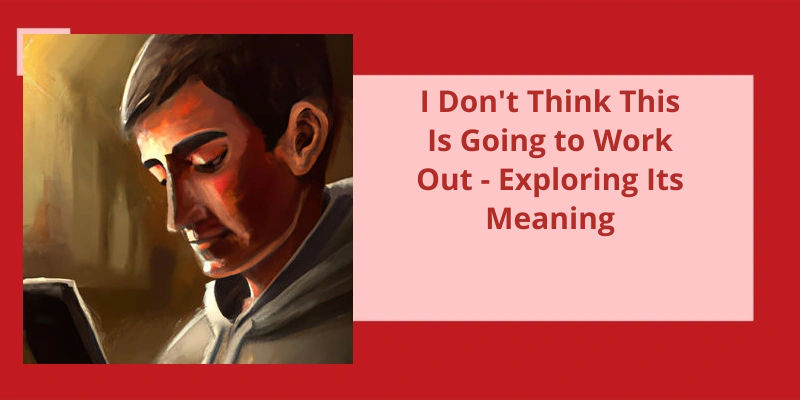One of the most crucial aspects of decision-making is the act of thinking before taking action or forming an opinion. It’s a process known as deliberation, where careful consideration is given to all the available options and their potential consequences. This involves weighing the pros and cons, analyzing the situation from multiple perspectives, and evaluating the potential long-term outcomes. Deliberation is a vital skill that helps individuals make informed choices and avoid rushed or impulsive decisions. It’s a process that requires patience, critical thinking, and a willingness to gather all relevant information before coming to a conclusion. Whether it’s deciding which career path to take or which car to buy, thoughtful deliberation can make all the difference between success and failure, happiness and regret.
What Does It Mean to Make a Consideration?
Making a consideration is an important part of decision making. It means taking the time to think about a situation or problem before making a decision or forming an opinion. This can help ensure that the decision or opinion is well-informed and thought out. Making a consideration involves gathering information, analyzing it, and weighing the pros and cons.
When we’re faced with a problem or decision, it can be tempting to rush into a solution without taking the time to fully understand the situation. However, failing to make a consideration can lead to poor decisions that have negative consequences. Taking the time to think through a problem can help ensure that all necessary information is considered before a decision is made.
Making a consideration can also help build empathy and understanding. When we take the time to consider different perspectives and viewpoints, we’re better able to understand the motivations and needs of others. This can be especially important in situations where we’re working with or dealing with people from different backgrounds or cultures. By making a consideration, we can avoid misunderstandings and build stronger relationships based on mutual respect and understanding.
Tips and Strategies for Making Effective Considerations in Decision-Making
Decision-making is a skill that can be challenging but can also be mastered with a few tips and strategies. Firstly, define the problem and establish clear criteria for making the decision. Then, gather relevant data and analyze the potential outcomes of each option. Consider the perspective of others and any potential biases that may influence the decision. Finally, take action and evaluate the decision’s success. By practicing these steps, you can make informed and effective decisions in a variety of situations.
Now that we’ve a clear understanding of what an opinion is, it’s important to recognize the significance of opinions and decisions. They play a critical role in how we navigate the world around us as they often shape our actions and beliefs. In many cases, decisions based on opinions have the potential to impact not just our own lives, but those of others as well. It’s therefore essential to be aware of how we form opinions and make decisions, and how these processes can be influenced.
What Is an Opinion or Decision?
An opinion is subjective and open to interpretation, influenced by personal beliefs, experiences, and emotions. It’s a reflection of an individuals perspective on a particular issue, idea, or situation. An opinion can change over time if new information or different experiences alter ones perception of the subject.
A decision, on the other hand, is a conclusion or resolution made after careful consideration and evaluation of available options. It’s a choice that leads to action or inaction and is based on facts, data, and other relevant information. Decisions can be influenced by personal values, biases, and preferences, but they’re generally taken with the intention of achieving a specific goal or outcome.
Opinions and decisions are closely related as they shape our thoughts, actions, and behavior. Our opinions can inform our decisions, and our decisions can reinforce our opinions. For instance, if an individual believes that climate change isn’t real, they might decide not to take any action to reduce their carbon footprint or support environmental policies.
Furthermore, opinions and decisions play a crucial role in social, political, and economic contexts. In a democratic society, peoples opinions influence how they vote and participate in governance. A decision made by a government or business can have significant impacts on society, the economy, and the environment. In some cases, a decision can be controversial and met with strong opposition from those who hold different opinions.
While opinions are subjective and open to interpretation, decisions are objective and based on facts and information. Both opinions and decisions can have significant impacts on individuals and society, underscoring the importance of critical thinking, open-mindedness, and evidence-based reasoning.
Making the right decision can sometimes be a challenging task, especially when it involves significant consequences. It requires an individual to critically analyze the situation to arrive at a well-informed choice. In this article, we will delve deeper into the intricacies of making the right decision and explore some effective strategies to help achieve this.
What Is the Meaning of Right Decision?
Making a right decision requires critical thinking, careful evaluation of available options, and consideration of potential consequences. It involves weighing the pros and cons of various choices and selecting the one that aligns with our values, goals, and beliefs. A right decision requires a thorough understanding of the problem at hand and a willingness to seek out all relevant information before choosing a course of action.
One of the key components of making a right decision is the ability to control our emotions and biases. Our emotions and biases can cloud our judgment, leading us to make decisions that aren’t in our best interest or that are based on false assumptions. By setting aside our personal feelings and prejudices, we can make impartial and objective choices that reflect our values and priorities. This is particularly important in situations where there are difficult trade-offs, where different options have both advantages and disadvantages.
Another important factor in making a right decision is considering the impact of our choice on others. We exist in a complex and interconnected world, and our actions have consequences that ripple outward to affect other people and the environment. By taking into account the potential effects of our decision on those around us, we can make choices that aren’t only good for us but also for the larger community. This requires empathy, compassion, and a willingness to see the world from different perspectives.
The Ethics of Decision Making and the Responsibility of Decision Makers
- The importance of ethics in decision making
- The responsibility of decision makers to consider the impact of their decisions
- The role of personal values in ethical decision making
- The importance of transparency in the decision-making process
- The potential consequences of unethical decision making
- The role of accountability in ethical decision making
- The connection between ethics and long-term success in business and society
- The need for ongoing education and training in ethical decision making
Source: What’s the difference between a good decision and …
Reflecting on our actions before we set them in motion is a valuable life skill that allows us to make sound and well-thought-out decisions. It’s important to consider all the possibilities and potential outcomes before committing to a course of action. This kind of deliberation is best captured by the phrase “think before you act.” But, there are other ways to express this concept that may add more nuance or formality to the idea, such as using the verbs contemplate, ponder, or mull over. In this article, we will explore these phrases and how they can be used to encourage thoughtful decision-making.
What Is Another Way of Saying Think Before You Act?
When it comes to decision-making, it’s important to be deliberate and thoughtful in your approach. Rushing in without fully considering all of the potential consequences can lead to serious mistakes, both in your personal and professional life. One of the key phrases used to encourage taking a more thoughtful approach to decision-making is “think before you act.”. This simple expression has become a staple of advice columns and self-help books for a reason – it really works.
However, there are other ways of expressing the same sentiment. One option is to encourage people to “consider the matter” before making any decisions. This variation emphasizes the importance of taking a step back and looking at the bigger picture before committing to a particular course of action. By doing so, you can ensure that you’ve a clearer understanding of the potential risks and rewards associated with your choices.
Another useful phrase to consider is “contemplate.”. This word is often used to describe a deep, focused form of thought. When you contemplate a decision, you’re taking the time to carefully analyze and evaluate all of the available information before making a choice. This can be particularly useful in complex situations where there are numerous factors to consider.
Similarly, “ponder” is another word that can be used to describe the process of careful consideration and reflection. This word is often associated with slower, more deliberate thought processes. When you ponder a decision, you’re taking the time to really think through all of the available options and weigh the pros and cons of each.
By doing so, you can reduce the risk of making hasty or poorly-informed choices that can have negative consequences down the line. So take your time, consider all of your options, and make informed decisions that align with your goals and values.
As human beings, we’re constantly making decisions and forming opinions. Sometimes these decisions are made quickly and impulsively, while other times they require careful thought and consideration. When we take the time to weigh the facts and consider all the options, we’re able to arrive at a judgment that’s informed and reasoned. In this article, we will explore the concept of judgment and it’s role in decision making.
What Is a Decision or Opinion Reached After Careful Thought?
The art of making decisions after careful thought is an essential aspect of human experience. Every day, individuals are faced with a myriad of choices that require consideration before a verdict can be reached. Decision-making is a critical life skill that determines the outcome of our actions. In essence, a verdict is a resolution or conclusion made after deliberation. It’s an unequivocal outcome that’s arrived at after weighing various factors that surround a situation.
Judgment is a culmination of the mental processes that inform an opinion. It isn’t a random conclusion, but a well-thought-out decision that considers all the elements that are involved. Arriving at a verdict isn’t always easy, and one has to consider both the short and long-term implications of their decision. The outcome of a decision can often have a profound impact on a persons life and the world around them. Therefore, proper thought and sensitivity become vital during the decision-making process.
It’s essential to note that making a verdict isn’t a solitary activity. Often, it involves other individuals and requires the input of different perspectives. A judgment formed after careful thought is rooted in logic and objectivity. The decision-maker must examine every possible angle and seek to grasp the issue from different standpoints. This way, the solution arrived at is an informed one that’s based on sound reasoning.
The ability to make decisions after careful consideration is a vital skill that’s nurtured through experience. One gets to appreciate the value of thoughtful deliberation, and how it can positively shape their lives. Making sound judgments also enhances self-esteem and confidence, as the individual takes ownership of their decisions. Moreover, understanding the power of a verdict allows one to appreciate the essence of accountability. A decision made through proper deliberation and consideration forms a basis for responsibility.
The Importance of Making Decisions Quickly vs. Taking Time to Think Things Through
It’s often necessary to make decisions quickly in certain situations, such as during emergencies or when faced with time-sensitive issues. However, taking time to think things through can lead to better decision-making and prevent mistakes or regrets. A balance between quick decision-making and thoughtful consideration is necessary for optimal outcomes.
Conclusion
In today's fast-paced world, it’s effortless to fall into the trap of hasty decision-making. However, the consequences of making impulsive decisions can be costly and irreversible. That’s why it’s so crucial to engage in deep and reflective thinking before forming any opinions or making any judgments. The act of deliberation requires patience, critical thinking skills, and a willingness to consider all perspectives. It’s a process that demands effort and time, but the benefits are immeasurable. Whether you’re considering a personal or professional decision, your approach must be thoughtful and informed. So, take the time to deliberate, weigh all the options, and make a decision that’s right for you.






